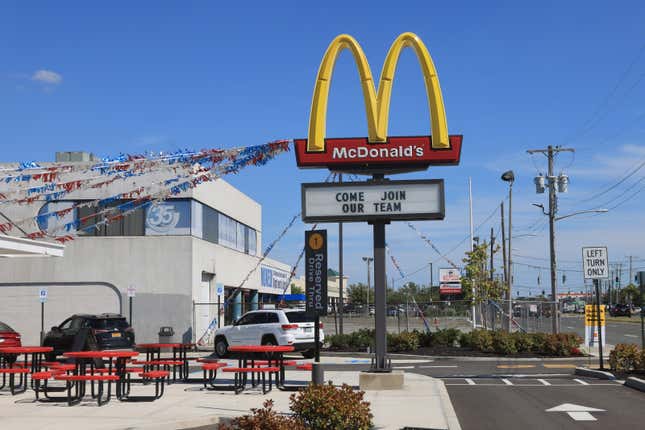
It’s not all happy meals these days in the land of Ronald McDonald.
Restaurant operators are pushing back against McDonald’s recent efforts to extend more control over its franchisees while refusing certain “joint employer” obligations.
“We want our independence. If McDonald’s does not want to be considered a Joint Employer, they need to stop acting like one,” said the National Owner’s Association (NOA), a group representing over 1,000 McDonald’s operators across the US, in a statement dated Apr. 19.
Last June, the fast food chain announced plans to tighten its franchising rules in the US, where an estimated 95% of stores are operated by independent owners. The changes included a new grading system, more frequent inspections, and a revamp of how it grants 20-year franchise licenses that emphasizes they are “earned, not given.”
Restaurant owners raised concerns that the new performance-based standards would put additional pressure on workers and operations. The National Franchisee Leadership Alliance, another group representing US McDonald’s operators, asked that the new rules be postponed until June 2023 rather than Jan. 1. McDonald’s rejected the request.
In March, NOA encouraged its members to write to the US Federal Trade Commission regarding their concerns about McDonald’s new franchising rules.
But not all franchise owners oppose the policy updates. Ten franchisee advisory councils leaders called out NOA in a statement: “We’re disappointed that a small but vocal group is pushing this counterproductive agenda, which threatens our business model and the livelihoods of future generations of franchisees.”
McDonald’s “joint employer” dispute
As McDonald’s extends more control over its franchisees, it also rejects that it’s a “joint employer,” absolving it of a great deal of legal liability over franchise owners’ actions. The assertion has legal backing.
According to the National Labor Relations Board (NLRB), McDonald’s does not hold responsibility for labor violations at its franchises—a decision that emerged from one of the biggest cases in the agency’s history.
It began in 2012 when franchise workers filed a complaint with the NLRB, claiming they were fired for their involvement in union organizing. McDonald’s maintained it was not liable because it could not be considered a “joint employer,” a definition that was expanded in 2015 under the Obama administration. The pro-worker move was intended to hold corporate owners accountable for labor practices at franchises, and mandated they engage in union bargaining.
The joint employer threshold was rolled back in 2018 under the Trump administration in a victory for corporate owners. It helped McDonald’s score a big win in 2019 when the NLRB ruled it could settle its dispute with franchise workers, and therefore was not found liable for unfair labor practices at independently-run restaurants. The Fast Food Workers Committee appealed the decision in 2021, but the settlement was upheld in April 2022. Under the ruling, McDonald’s has not been held responsible for use of child labor at a franchise.
Related stories
💰 McDonald’s ex-CEO is paying an extra $400,000 for obscuring the reason behind his termination
🪧 Fast food wages are way past the “Fight for $15”
🤨 How McDonald’s latest ad got everyone talking about an everyday facial expression